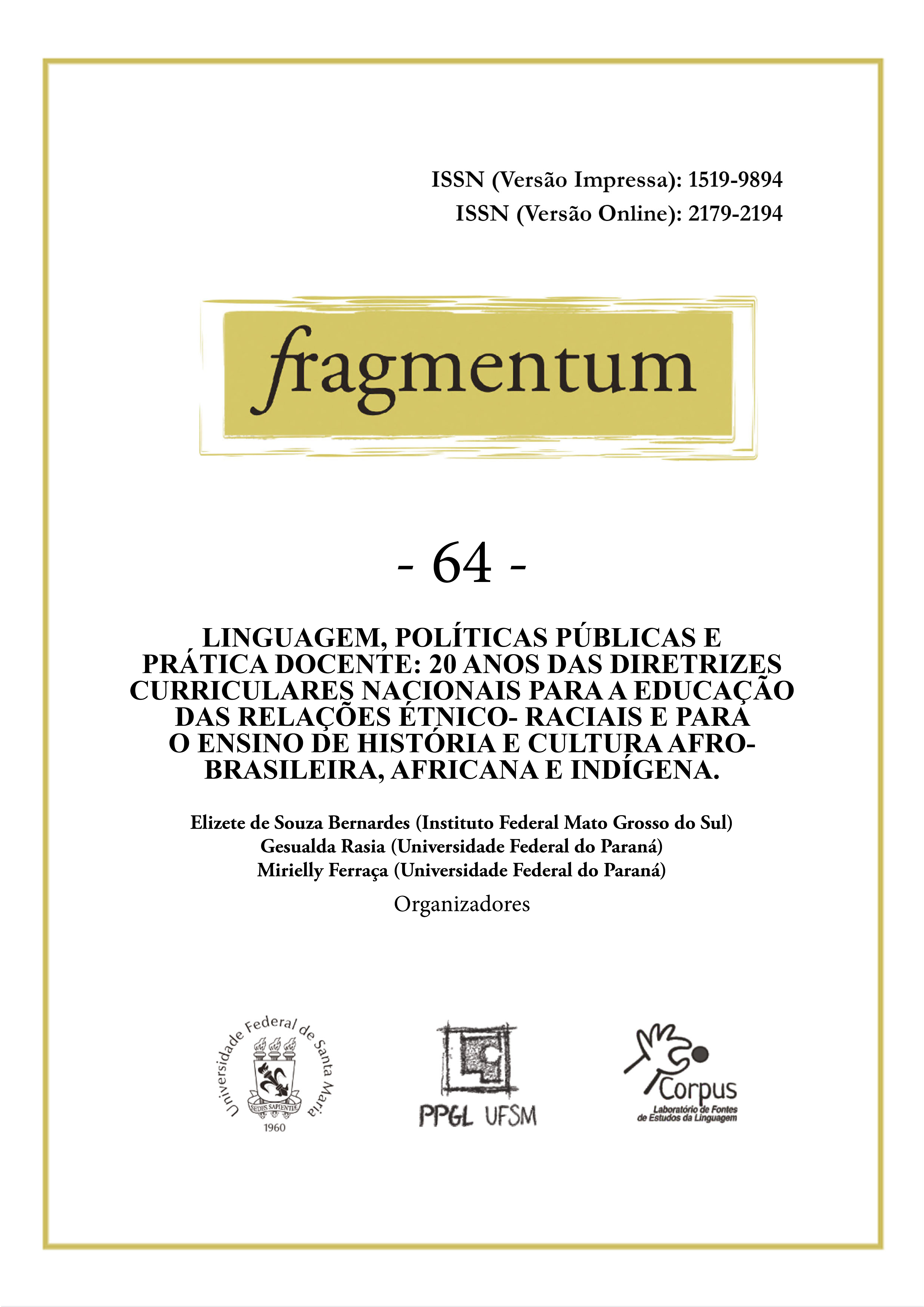O projeto “ERER quilombola: olhares transgressores” – uma proposta de educação antirracista
DOI:
https://doi.org/10.5902/2179219487883Palavras-chave:
Educação antirracista, Lei 10.639/03, igualdade racialResumo
Este artigo tem como propósito apresentar a construção e implementação de um projeto de educação antirracista nomeado “ERER quilombola: olhares transgressores”. Considerando que a educação é o espaço de transformação ou de reprodução das condições materiais e sociais da vida. Não há como imaginar a realidade vigente sem contemplar a educação como espaço vital de funcionamento das sociedades contemporâneas. É neste contexto que a educação das relações étnico-raciais se faz necessária. Tratar do racismo e de seus desdobramentos práticos é objeto de considerável dificuldade, haja visto que o fenômeno assumiu, na sociedade brasileira, o papel de modulador das relações sociais. Tanto do ponto de vista histórico, quanto no processo de formação social do país é inegável que a desigualdade racial é estruturante das relações sociais no Brasil. É na esteira desse conjunto complexo de relações que, a partir de muitas reflexões e debates, decidiu-se desenvolver o projeto. A atividade docente dos coordenadores do projeto, aliada à sua militância fez surgir o desejo de impactar de forma positiva o processo educacional, no que tange à educação das relações étnico-raciais, no âmbito do município de Pelotas-RS. A reflexão ora apresentada fundamenta-se sobre uma matriz de análise qualitativa, na qual os dados elencados derivam de levantamento processado via formulários online apresentados aos/as docentes e coordenadores/as participantes do estudo resultante das ações empreendidas pelo projeto ERER Quilombola: Olhares transgressores. Considerando o fato de que a pesquisa resulta de um conjunto de ações desenvolvidas nas práticas em educação das relações étnico-raciais (ERER), a proposta destes instrumentos era avaliar a compreensão sobre o sentido da lei 10.639/03, bem como sobre as contribuições que ferramentas de formação podem fornecer à qualificação do trabalho em educação para a promoção da igualdade racial.
Downloads
Referências
ALMEIDA, Silvio Luiz de. Racismo estrutural. São Paulo: Sueli Carneiro/Pólen, 2019.
BANDEIRA, Charlene da Costa; FARIAS, Bruna Rosa. Do Quilombo eu vim: a criação de uma psicoQUILOMBOlogia como estratégia de aquilombamento e (re)existência de estudantes quilombolas. In: GOMES, R.C.M.; SILVA, E.R.; FARIA, J. O que pode a psicologia em tempos de pandemia de Covid-19. Bauru: Gradus Editora, 2023.
FANON, Frantz. Pele negra, máscaras brancas. São Paulo: UBU Editora, 2020.
FLICK, Uwe. Introdução à Pesquisa Qualitativa. Porto Alegre: Artmed, 2009.
FREDRICKSON, George M. Uma história comparada do racismo: reflexões gerais. In: WIEVIORKA, Michel. Racismo e modernidade. Lisboa: Bertrand Editora, 1995, pp. 44-55.
LANDSON-BILLINGS, Gloria. Discursos racializados e epistemologias étnicas. In: DENZIN, Norman K.; LINCOLN, Yvonna S. et al. O planejamento da pesquisa qualitativa: teorias e abordagens. Porto Alegre: Artmed, 2006.
NASCIMENTO, Abdias do. O genocídio do negro brasileiro: processo de um racismo mascarado. São Paulo: Perspectivas, 2016.
PEREIRA, André Luis. Mecanismos de Promoção da Igualdade Racial em nível local: uma análise do processo de implementação das políticas de promoção da igualdade racial em Porto Alegre (2004-2014). Tese (Doutorado em Sociologia) PPGS/UFRGS. Disponível em: http://hdl.handle.net/10183/155997.
SOUSA, Neusa Santos. Tornar-se Negro. Rio de Janeiro: Edições Graal, 1983.
TELLES, Edward. Racismo à Brasileira: uma nova perspectiva sociológica. Rio de Janeiro: Relume Dumará/Fundação Ford, 2003.
TOURAINE, Alain. Racismo hoje. In: WIEVIORKA, Michel. Racismo e modernidade. Lisboa: Bertrand Editora, 1995, pp. 25-43.
WIEVIORKA, Michel. Racismo e modernidade (introdução). Lisboa: Bertrand Editora, 1995, pp. 09-22.
Downloads
Publicado
Como Citar
Licença

Este trabalho está licenciado sob uma licença Creative Commons Attribution-NonCommercial-NoDerivatives 4.0 International License.
Ficam concedidos a Fragmentum todos os direitos autorais referentes aos trabalhos publicados. Os originais não devem ter sido publicados ou submetidos simultaneamente a outro periódico e não serão devolvidos. Em virtude de aparecerem nesta revista de acesso público, os artigos são de uso gratuito, com atribuições próprias, em aplicações educacionais e não comerciais.




